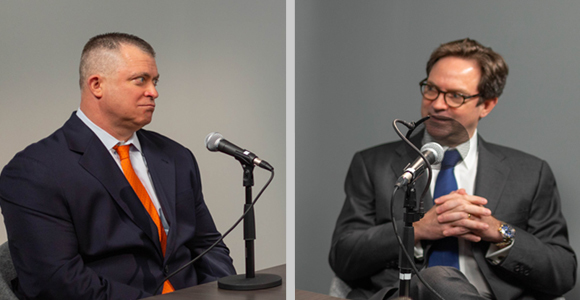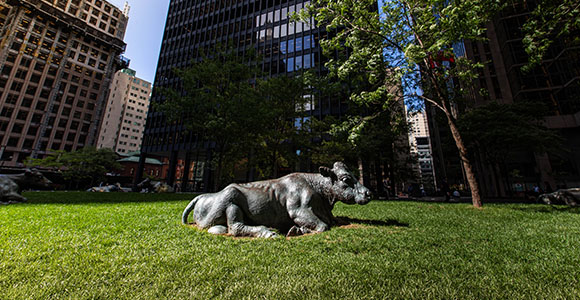Heavyweights in mining weigh in on current trends impacting the sector

Host: Amy Van Arnhem, Managing Director, Senior Relationship Management, TD Securities
Guests: Greg Barnes, Managing Director and Head of Mining Equity Research, TD Securities and Rick McCreary, Deputy Chair, TD Securities
Industry leaders Rick McCreary and Greg Barnes offer their take on the outlook of the current mining and metals landscape. Host Amy Van Arnhem leads a discussion that answers why, over the next decade or so, it may be difficult to avoid a supercycle for metals prices, how the transition to a low-carbon economy is astronomically impacting supply and demand and the ramifications for the future of the sector to attract capital.
Listen to additional episodes for more perspectives from a variety of thought leaders on key themes influencing markets, industries and the global economy today.
[MUSIC PLAYING]
NARRATOR: Welcome to Viewpoint, a TD Securities podcast. Listen in as we draw perspectives from a variety of thought leaders on key themes influencing markets, industries, and the global economy today. We hope you enjoy this episode.
AMY VAN ARNHEM: Hello, and welcome to episode 9 of Viewpoint, a TD Securities podcast. My name is Amy Van Arnhem. I'm a Managing Director, Senior Relationship Management, TD Securities, and I will be your host for today's episode. I am joined by my colleagues Rick McCreary, deputy chair corporate and investment banking; and Greg Barnes, managing director and head of mining equity research.
Greg joined TD Securities in December 2005. He currently covers the Canadian large cap base metal, gold, and fertilizer companies, and has been an analyst for 28 years. Rick has over 30 years of experience in the resource sector as a principal in executive and board roles with various corporates, as well as a financial advisor in investment banking.
First, wow-- those are both amazing careers in the resource industry and you're both leaders not only for TD Securities, but for the entire sector, so thank you so much for joining me today.
Rick, PDAC is coming up in June. Could you start us off by explaining what PDAC is, and its importance to the mining industry in Canada?
RICK MCCREARY: The history of PDAC conference, as I found out, started back in the early '30s, when supposedly, prospectors weren't allowed to file work permits. And there was a move afoot to have engineers have to stamp them, and the entrepreneurial prospectors didn't like that. They got together at one of the hotels in Toronto and managed to defeat the bill. And that led to annual gatherings of these entrepreneurial prospectors since the '30s.
It's grown. And Greg will know, when we were in university, it's a great place to come as students and meet professionals. And it's a lot of fun. And today, it's probably the most comprehensive conference in the mining sector in the world. I think there's thousands and-- 20,000, I think, annually that come. It covers everything-- technical side of the business, financial side, ESG side. It's really a world-leading conference.
AMY VAN ARNHEM: It definitely speaks to the strength that we have in the mining sector in Canada. So Greg, could you speak to some of the recent changes in key metal pricing? What are some of the high-level themes that are driving prices, and what should we monitor going forward?
GREG BARNES: Yeah. Thanks, Amy. I think it's a combination of short and long-term factors right now, and both are playing a role in the volatility we're seeing in metal prices, which has been quite high, particularly over the pandemic. But I think right now, the short-term factors are really taking a lead. And obviously, we're all worried about inflation, and interest rates are going up.
COVID-19 is still have any impact. There are still absenteeism problems, and that's impacting production still to this day. And I think most specifically with COVID-19, it's the lockdowns in China, which, with China consuming 50% of global metal demand-- when you lock down China, you really impact metals demand.
And I think that's beginning to ease now. Just in the last couple of days, we've heard that the lockdowns in Beijing and Shanghai in particular are beginning to ease up, and they're focusing on getting manufacturing back up and running again. And that has seen metal prices rebound a little bit from the lows we've seen over the last month or so.
The war in Ukraine clearly has had an impact as well. Ukraine isn't a big producer of base metals, but Russia is-- particularly nickel. And that has caused some absolutely massive volatility in the nickel price-- so a lot of short-term factors playing out currently. And the recession fears as well. Clearly, you don't want to own base metals going into recession. Global demand slows down, inventories build, and it's just not a good position to be in.
But I think the longer term factors are also playing a big role right now, and that is the transition to a low-carbon economy. That will be metals-intensive. You'll need nickel, you'll need copper, and you'll need a lot of it. And you're really facing a resource-constrained world at the moment. There's not a lot of these metals out there. They're increasingly difficult to find.
Where you do find them, they're increasingly difficult places in the world, politically, socially, just geographically. And I think that is going to put a support level on base metal prices. I don't think we'll see the lows we've seen back in 2015, 2016, when copper was down around $2 a pound. I don't think we're going back that low.
So this energy transition, I think, will drive higher longer term prices. And I actually think we are on the cusp of supercycle for the metal prices. You need hundreds of billions of dollars of investment in new mining capacity. And it's increasingly difficult to raise that kind of money, whether it's in the equity markets, the debt markets. Investors are very cautious about this, but the world needs it, so metal prices are going to have to go higher.
AMY VAN ARNHEM: So you mentioned the supercycle. We've heard that term be used in the past, and we're on the cusp of it now. What are some of the factors that you need to see in order to convince you that we are actually entering into that?
GREG BARNES: And I think it all leads back to the low-carbon economy, the energy transition, and the lack of resources out there. And you've got this confluence of factors coming together over the next decade that will drive higher prices, just because you need the investment in that industry, and it's very difficult to raise that money.
I don't use the term supercycle lightly. I've been there before several times. But if you look out over the next 10, 15, 20 years, it's really difficult to avoid that conclusion right now, in my view.
AMY VAN ARNHEM: And will you still be here around, or you'll be retired by the time you get to the final super cycle?
GREG BARNES: 15 to 20 years? No, I will not be around.
AMY VAN ARNHEM: Won't be here to see it-- no, that's great. So it actually leads into the next question, Rick, that I wanted to ask you, which is just about how some of these trends are impacting the financial trends, M&A, and what is the ramification for the future of the sector to attract capital?
RICK MCCREARY: It, by definition, is cyclical business. And you could tell by our backgrounds, Greg and I have been through a few of them. History really does repeat itself. I remember very acutely in the late '90s, early 2000s, when gold went to, I don't know, $225 an ounce, and we're in the middle of a tech boom, and in the firm they looked at us and say, why are these dinosaurs still here?
And what our industry did was they said, OK, we can't finance ourselves because nobody's interested in our sector, so we've got to consolidate to take the cash flows from our business to be able to survive. So there was a lot of consolidation 2000 to 2005, and then, ironically, for whatever reason, then from 2004, '05, onwards up to 2011, we had a bull run.
And the industry was much better positioned now, because it had consolidated. And then, as always happens towards the end of a cycle, the investors want to talk about growth, growth, growth, growth, growth, growth. We saw a lot of financing of development stage companies, and we saw lots of majors acquiring development stage companies.
And as an old colleague of mine has said, the industry was selling a dream. The dream came true. It was called a nightmare. And the industry had to execute on building these projects. And as Greg has alluded to, it's difficult, and so-- went through a period of rationalizing the business, making sure the right assets were being built.
Commodity prices had rolled over, and again, the industry tightened its belt. And then, starting with Barrick Rangold, we started to see consolidation occur again. Metals prices were down. Financing was occurring, but not a lot, and the industry consolidated. And now we've gone through a wave of it.
Just this morning, another two mid-year announced a merger, and we're going through that period of consolidation again. And I think the industry hopes-- I personally hope-- we will then go back into a phase of growth.
And to Greg's comments, these deposits are very, very hard to find, so you can consolidate and move assets around, but at the end of the day, you need new supply. And, to me, it feels like that consolidation we had 2000 and 2005 is occurring right now, and it's going to be followed afterwards by growth again.
AMY VAN ARNHEM: So what is it like right now for a development company that might be looking to raise capital in the markets?
RICK MCCREARY: Depending on the commodities, it varies a little bit, but I'd say it's difficult right now. We're spending a lot of time helping development stage companies pursue creative ideas to finance, but frankly, one of the ways to finance is ultimately to sell yourself to a larger company with cash flow and a balance sheet that can build a project and execute. And that's what tends to happen in these markets.
AMY VAN ARNHEM: And just a question on what companies like that are doing with their cash flow-- is it centered around M&A and looking for additional assets, or are they starting--
RICK MCCREARY: Yeah.
AMY VAN ARNHEM: --to pay it back a bit?
RICK MCCREARY: So during that growth phase, that-- wasn't a lot of free cash flow out of business, and industry got their knuckles rapped pretty hard. The investors got them to focus on getting net free cash flow and returning capital, either in share buybacks or dividends. And that's gone on for a while.
The issue with the market is it'll be fickle. There'll be a theme for a while about cash flow and return to capital, and then they start to go, well, where's your growth? Where's your growth? Where's your growth? Well, the investors are starting to allude to that where your growth, where's your growth, where's your growth?
Well, at the end of the day, the mining companies-- their client base, if you will, their owners are the investors, and they have to appease them. And so they are now starting to look more actively at development stage opportunities, and over the last couple of years, there's been at least six or seven transactions where development stage companies have been acquired.
AMY VAN ARNHEM: Great. Thanks. So, Greg, I'm going to start with you on the next question. Could you speak to the evolution of social and environmental engagement in the mining industry? What are effective tools and strategies that the mining industry has deployed?
GREG BARNES: Well, ESG-- environment, social, and governance-- has been a key element in the markets for the last five or six years, but I think it goes back a lot further than that for the mining industry. You cannot build a mine in a local community, whether it's in North America, Africa, South America, without the community being on side.
And to get them on side, you have to commit to protecting the environment, providing jobs, and doing the right thing-- paying your taxes, paying royalties. And I think, over the last 25, 30 years, the mining industry has recognized that, and has done a good job generally-- particularly Canadian companies, in my view-- in addressing those issues and addressing those concerns. And I think, basically, they've been good actors, particularly in the environment and the social side of things, in my view.
Now, the industry isn't perfect. We've seen tailings dam disasters over the last five or six years that have been quite problematic. But the industry did rally around that, focused on it. There's now a set of rules in place effectively about how tailings dams should be managed and built. So we've learned from that.
But I think the tools that are being used-- again, committing to providing jobs, committing to the environment-- these are things that companies don't take lightly. They're very committed to them, certainly from what I'm seeing. Executive compensation is being tied to meeting these ESG goals, and I think that's very effective.
And quite frankly, I just think governments and non-government organizations have held the industry's feet to the fire, and they are delivering. Speaking to Rick's point about where the industry is today, I think it's actually in a very, very good place. It's well-managed. It's well-funded. It's generating free cash flow. And I do think these ESG issues are taken very, very seriously at the highest level of the company.
AMY VAN ARNHEM: And you did speak earlier to the metals of the future--
GREG BARNES: Mm-hmm.
AMY VAN ARNHEM: --the metals that would help with this energy transition. Maybe, Rick, could you just give us your thoughts on how that could play a role in really making these mining metal companies, I guess, more relevant in the whole transition going forward?
RICK MCCREARY: That's an interesting question. Working in an investment bank, we have all sorts of different industry groups, and they are at various times in bull periods and bear periods. And oftentimes, people will lump mining with oil and gas and call it resources.
And we're in this situation now where the world is trying to decarbonize, and people will say, well, that's-- and mining's in that bin, if you will, as well. And it's actually the opposite, because for the world to decarbonize, they're going to-- as Greg talked about, we're going to need more copper, and we're going to need more nickel, and we're going to need more cobalt, and we're going to need more lithium.
And our clients have found it challenging enough to find these deposits, and now to go into a phase of the world where we have a new source of demand, which is-- and you've seen all the projections are just astronomical. I know the mining companies have had a hard enough time trying to find deposits, and now it's just going to get even harder.
And it's going to drive investment in our sector, because at various times, our sector gets under-capitalized, and I'd say it probably has been right now. So it's going to be a big boom. And in the metals market, I try not to personally project what demand's going to be, being a technical person by background, but the supply side is very, very hard. And that's what's going to drive the metals.
AMY VAN ARNHEM: Great. Well, thank you both very much for joining me today. I do have one final question, if you would indulge me. Rick, my understanding is that you were the first drummer for the Tragically Hip. And so, true or false, and if it's true-- which I suspect it is-- do you regret your decision--
[LAUGHTER]
--to go into finance instead of staying as a drummer?
RICK MCCREARY: Thank you for asking that question. When people find this out, I do get that question. Yes, it's true. I played in high school with Robbie and Gord. Gord Downie was a couple of years behind us in high school in another band. University-- we all went our separate ways. Then in fourth year, we actually put the Hip together with Downie as the singer.
And, interestingly as it is, I was busy doing my undergrad thesis. I was playing in an engineering band. I was trying to find my job for graduation, and I said, sorry, guys, I'm too busy. I've got other things I have to do. Now, at the time, I think I practiced with them four or five times and that was it, and the rest is history. But I do get this question a lot.
As a colleague of mine said, and asking between the two of them, the bass player for the Hip asked Gord, what do you think? Do you think Rick's done better to have been a banker or better to stay in the Hip? And Gord's response was, I think he's done all right.
AMY VAN ARNHEM: Yes, you have. I will agree. Well, thanks again very much.
NARRATOR: Thank you for listening to Viewpoint, a TD Securities podcast. If you enjoyed this episode, subscribe to this series on Apple Podcasts or on your favorite podcast platform. For more thought leadership content, visit TDSecurities.com, and follow us on LinkedIn for all the latest TD Securities updates. For relevant disclaimers to this podcast, please refer to the Viewpoint episode page on our website.
This podcast should not be copied, distributed, published or reproduced, in whole or in part. The information contained in this recording was obtained from publicly available sources, has not been independently verified by TD Securities, may not be current, and TD Securities has no obligation to provide any updates or changes. All price references and market forecasts are as of the date of recording. The views and opinions expressed in this podcast are not necessarily those of TD Securities and may differ from the views and opinions of other departments or divisions of TD Securities and its affiliates. TD Securities is not providing any financial, economic, legal, accounting, or tax advice or recommendations in this podcast. The information contained in this podcast does not constitute investment advice or an offer to buy or sell securities or any other product and should not be relied upon to evaluate any potential transaction. Neither TD Securities nor any of its affiliates makes any representation or warranty, express or implied, as to the accuracy or completeness of the statements or any information contained in this podcast and any liability therefore (including in respect of direct, indirect or consequential loss or damage) is expressly disclaimed.

Amy Van Arnhem
Managing Director, Senior Relationship Management, TD Securities

Amy Van Arnhem
Managing Director, Senior Relationship Management, TD Securities

Amy Van Arnhem
Managing Director, Senior Relationship Management, TD Securities
Amy is responsible for providing holistic cross product global coverage to senior executives for Canadian institutional clients. In her role she manages stakeholder relationships by promoting a collaborative and integrated approach across the firm. In 2007, Amy joined the Sales and Trading rotational program at TD Securities where she gained exposure in Asset Securitization, Proprietary Equity, and Institutional Equities. In 2008, she joined the Institutional Equity Sales desk team where she covered Canadian equity clients.

Greg Barnes
Managing Director and Head of Mining Equity Research, TD Securities

Greg Barnes
Managing Director and Head of Mining Equity Research, TD Securities

Greg Barnes
Managing Director and Head of Mining Equity Research, TD Securities
Greg joined TD Securities in December 2005 as the firm’s base metals analyst. He currently covers the Canadian large capitalization base metal, gold, and fertilizer mining companies and has been an equity analyst for 21 years. Prior to joining TD Securities, Greg worked as a mining analyst for several Canadian independent brokerage firms. He has a strong background in the mining industry, having spent two years with Kennecott Canada, a subsidiary of Rio Tinto, and four years with Falconbridge Ltd., where he was involved in corporate development and marketing.

Rick McCreary
Deputy Chair, TD Securities

Rick McCreary
Deputy Chair, TD Securities

Rick McCreary
Deputy Chair, TD Securities
Rick has over 30 years of experience in the resource sector as a principal in executive and board roles with various corporates, as well as a financial advisor in investment banking. On the corporate side, Rick started his career with Gulf Canada as an exploration geophysicist, later working for Noranda in engineering, technology development, technical services, and metals marketing. His most recent corporate role was directing corporate development activities at Barrick Gold as Senior Vice President Corporate Development, where he led over US$1.5 billion in non-core asset divestitures. In investment banking, Rick is currently Deputy Chair, focused on senior client relationship development with C-suite executives and board of directors.




